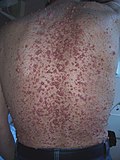Neurofibromatosis
Neurofibromatosis is a genetic conditions, also known as von Recklinghausen's disease. It is abbreviated as NF.
It comes in several flavours:
- Neurofibromatosis type 1 - NF1 (peripheral).
- Neurofibromatosis type 2 - NF2 (central).
- Neurofibromatosis type 3 - Schwannomatosis.
Neurofibromatosis type 1
- Autosomal dominant.
Diagnosis
Features (need 2/7 to diagnose):[1]
- Two or more neurofibromas or one plexiform neurofibroma.
- May give rise to a malignant peripheral nerve sheath tumour.
- Café-au-lait spots.
- Freckles in axilla or inguinal area.
- Optic nerve glioma.
- Iris hamartomas (Lisch nodules).
- Sphenoid dysplasia or typical long-bone abnormalities (e.g. bowing).
- First-degree relative with NF1.
Mnemonic
Diagnostic criteria CAFE SPOT:[2]
- Café-au-lait spots.
- Axillary or inguinal freckling.
- neuroFibroma (two or more) or plexiform neurofibroma (one).
- Eye hamartomas (Lisch nodules).
- Skeletal abnormalities, e.g. sphenoid dysplasia, leg bowing.
- Positive family history. †
- Optic Tumour (optic nerve glioma).
Note:
- † One could include paraganglioma here.
Images
Others
Possible association
Neurofibromatosis type 2
- Caused by mutations in the NF2 gene;[6] this gene is also known as merlin.[7]
- Reduced life expectancy.
- Mean age at diagnosis: 35years.
Diagnosis
Features (need 1/3 to diagnose):[8]
- Bilateral CNVIII masses on imaging.
- Unilateral CNVIII mass + first-degree relative with NF2.
- First-degree relative with NF2 and 2/4 of the following:
- Meningioma (meningothelial meningioma) up to 50% of the cases.[9]
- Glioma, mostly spinal ependymomas (up tp 20% of NF2 cases affected).
- Schwannoma.
- Juvenile cataract.
Mnemonic MISME:[10]
- Multiple Inherited Schwannomas.
- Meningiomas.
- Ependymomas.
Other:
- Cerebral microhamartomas.
- Schwannosis (Schwann cell proliferations).
- Peripheral neuropathy.
Meningioangiomatosis
- Cortical proliferations of meningeothelial cells around small vessels.
- May occur within NF2 and sporadic.
- Associated with seizures and/or headaches.
- Often asymptomatic.
See also
Schwannomatosis
- Autosomal dominant.
- Prevalence: 1:155000 (UK).
- Distinct entity from NF2, mainly due to absence of vestibular schwannomas.
- Mean age at diagnosis: 40years.
- Life expectancy better compared to NF2.
Diagnosis
Features:[11]
- Two or more non-intradermal schwannomas.
- Radiological exclusion of vestibular schwannoma.
- NF2-mutation excluded.
- One schwannoma or meningioma and one relative with confirmed schwannomatosis.
- Germline SMARCB1 or LZTR1 variant and histologically confirmed schwannoma or meningioma.
IHC
- INI1 mosaic pattern in schwannomas.[12]
References
- ↑ URL: http://emedicine.medscape.com/article/1177266-overview. Accessed on: 3 May 2010.
- ↑ URL: http://www.paeds.co.uk/wiki/index.php?title=Mnemonics#Neurofibromatosis_Type_1_diagnostic_criteria. Accessed on: 30 May 2011.
- ↑ Alexakis, N.; Connor, S.; Ghaneh, P.; Lombard, M.; Smart, HL.; Evans, J.; Hughes, M.; Garvey, CJ. et al. (2004). "Hereditary pancreatic endocrine tumours.". Pancreatology 4 (5): 417-33; discussion 434-5. doi:10.1159/000079616. PMID 15249710.
- ↑ Agaimy A, Hartmann A (October 2010). "[Hereditary and non-hereditary syndromic gastointestinal stromal tumours]" (in German). Pathologe 31 (6): 430–7. doi:10.1007/s00292-010-1354-6. PMID 20848108.
- ↑ Castoldi, L.; De Rai, P.; Marini, A.; Ferrero, S.; De Luca, V.; Tiberio, G. (2001). "Neurofibromatosis-1 and Ampullary Gangliocytic Paraganglioma Causing Biliary and Pancreatic Obstruction.". Int J Gastrointest Cancer 29 (2): 93-98. PMID 12754392.
- ↑ Online 'Mendelian Inheritance in Man' (OMIM) 101000
- ↑ Online 'Mendelian Inheritance in Man' (OMIM) 607379
- ↑ URL: http://emedicine.medscape.com/article/1178283-overview. Accessed on: 3 May 2010.
- ↑ URL: http://moon.ouhsc.edu/kfung/jty1/neurotest/Q13-Ans.htm. Accessed on: 26 October 2010.
- ↑ URL: http://emedicine.medscape.com/article/342667-overview. Accessed on: 20 February 2012.
- ↑ Evans, DG.; Bowers, NL.; Tobi, S.; Hartley, C.; Wallace, AJ.; King, AT.; Lloyd, SKW.; Rutherford, SA. et al. (Jun 2018). "Schwannomatosis: a genetic and epidemiological study.". J Neurol Neurosurg Psychiatry. doi:10.1136/jnnp-2018-318538. PMID 29909380.
- ↑ Caltabiano, R.; Magro, G.; Polizzi, A.; Praticò, AD.; Ortensi, A.; D'Orazi, V.; Panunzi, A.; Milone, P. et al. (Jun 2017). "A mosaic pattern of INI1/SMARCB1 protein expression distinguishes Schwannomatosis and NF2-associated peripheral schwannomas from solitary peripheral schwannomas and NF2-associated vestibular schwannomas.". Childs Nerv Syst 33 (6): 933-940. doi:10.1007/s00381-017-3340-2. PMID 28365909.









